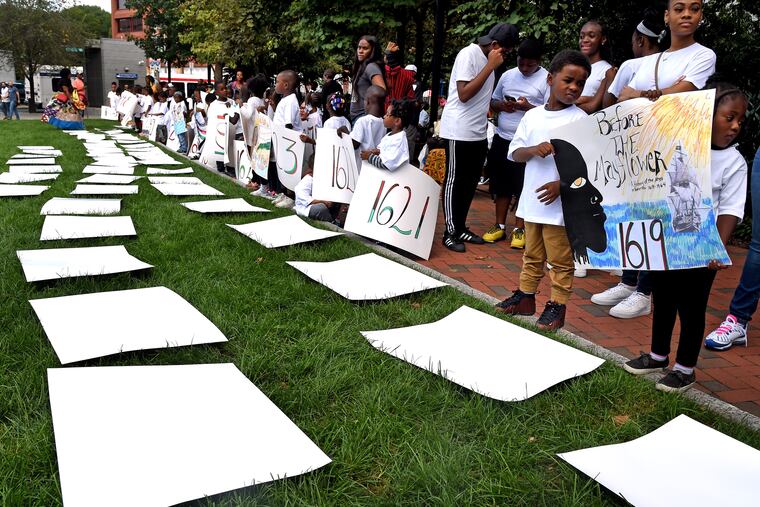400 children in Philadelphia mark 400 years since start of black slavery in America
A ceremony commemorated the arrival of the first enslaved Africans in the land that would become the United States, and injustices faced by the black community ever since.

Keith Collins, the spiritual leader of the Church of the Overcomer, brought 25 children with him to Independence Mall on Sunday afternoon to join hundreds of other black families marking an important anniversary.
The 20-mile trek from Trainer, Delaware County, was something of a pilgrimage for him and the youngest members of his congregation. Together, the group joined a ceremony commemorating the arrival, 400 years ago, of the first enslaved Africans in the land that would become the United States and the injustices the community has faced in the years since.
“This isn’t just black history, this is all history,” Collins said. “This is this history that shaped the world. And until we understand the things that put this system in place, nothing will improve.”
Sunday’s event on Independence Mall dovetailed with similar ceremonies this weekend at Point Comfort, a Virginia site where the first of two ships carrying human cargo to an English colony in North America landed in late August 1619.
The local commiseration ceremony was organized by Michael Coard, a lawyer, activist and founding member of Philadelphia’s Avenging the Ancestors Coalition, who put out the call a month ago for children to participate.
“There were 400 years of legal and official racism in America,” Coard said as he addressed the crowd in the afternoon heat. “So today, we’ll have 400 children symbolize those 400 years.”
In a July 27 column in the Philadelphia Tribune, Coard appealed to black churches, mosques and temples in the region, telling their members “your children, grandchildren, nieces and nephews can play an important role.”
“Although slavery was founded in Virginia, which is in the South, it wasn’t unique to that colony or state or region,” Coard wrote. “It also happened in the North, including right here in Philadelphia.”
The age of the participants was no accident: Coard wanted children to be the focus because of the large number of child slaves brought to this country.
And there was an underlying symbolism for their involvement Sunday, he said — a signaling of hope for the future of the black community.
“When we talk about black history and we say ‘We shall overcome,' that’s a great concept," Coard said. “But instead of overcoming, let’s go back and share this message with the next generation.”
The ceremony’s location was similarly deliberate. All 400 children lined up near the President’s House, a memorial that Coard helped pushed for that acknowledges George Washington’s reliance on slave labor in his home during his presidency.
Throughout the proceedings, children and young adults, from preschoolers to teenagers, walked across a stage, each one holding handmade signs signifying a year between now and 1619. Some of the signs were adorned with artwork, and told stories of important figures and era in black history.
“I’m just happy to be out here with youth and adults that care about history and heritage as much as I do,” said Drew Thompson, a 14-year-old West Philly native who was part of the procession. “People try to forget 400 years of slavery like it didn’t happen, but we don’t forget. And we should remind them where we came from.”
Farugh Maat agreed. The Hatboro resident brought all four of his daughters to participate in the ceremony. He hoped that all of them, from his youngest, who is 8, to his oldest, 14, took the lessons spoken there to heart.
“If they don’t know where they are from, they’ll have a disconnect, and we don’t want that,” Maat said. "I spent 15 years of my life hating what I looked like, hating my hair, hating that I was ‘different.’
“If I can prevent them from going through that for 15 years, and get a fresh start, I’ll do that."